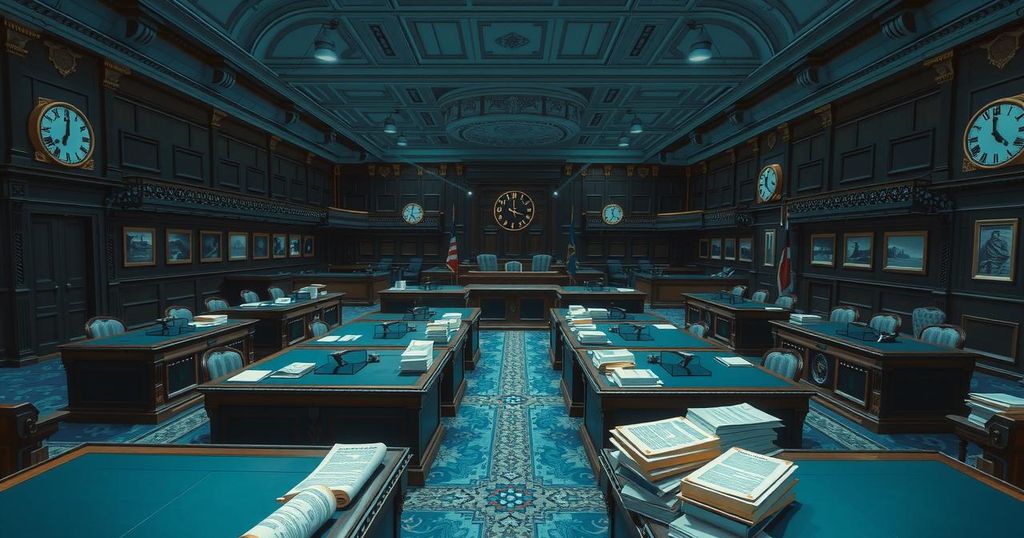Senate Moves Towards Funding Vote Amid Shutdown Concerns
The upcoming Senate vote on a stopgap funding bill has created a tense atmosphere as deadline looms. With Republicans needing Democratic votes to avoid a government shutdown, the prevailing question is whether Democrats will yield or hold firm. The decision carries high implications for citizens and federal operations as negotiations unfold.
Senate Set to Vote Amid Wavering Democratic Support
As the clock ticks down to the looming shutdown deadline, the Senate gears up for what could be a tense vote on a stopgap funding bill aimed at keeping the government running. Set for Friday, this vote comes on the heels of wavering Democratic opposition, which could shift the balance. A notably strong contingent of those willing to vote ‘no’ appears to be losing steam as some Democrats reconsider their positions amid the intricate maneuvering between party leadership. The stakes are high, and the atmosphere crackles with uncertainty as negotiations continue right up to the wire.
Democrats Push for Shorter Funding Period
At the heart of this standoff lies the Democrat’s insistence on including an amendment that would create a shorter stopgap period—extending funding only until April rather than September. They aim to force the Republicans, predominantly backed by Senate Majority Leader John Thune, to earn their votes for cloture, a procedural move needed to keep the bill’s progress alive. It’s a textbook Washington strategy in a game of brinkmanship, where leverage can quickly unravel or solidify depending on how discussions evolve. Thune’s challenge is clear: he needs at least eight Democratic votes to push forward without facing a filibuster.
Negotiating Amid Internal Party Dynamics
It’s hard to ignore the pressure building within the Democratic ranks as well. Despite being in the minority, chatter among them reflects a desire to strike some form of a deal even while many are hesitant about capitulating to a funding plan they see as too permissive for President Trump. On Thursday, Thune indicated openness to their amendments if it meant averting the shutdown, setting a potential pathway forward. However, some senators remain staunchly resistant, valuing principle over perceived short-term gains and signalling they might not budge on the cloture vote either.
The Shutdown Dilemma for Democratic Senators
If Democrats ultimately choose not to compromise, the prospect of a government shutdown will loom large. A significant number of senators, like Virginia’s Mark Warner and Arizona’s Mark Kelly, have firmly stated they will oppose the bill, emphasising their contention that the Republican proposal is both inadequate and fraught with risks for American public interests. While some members express willingness to navigate the shutdown, others are shaken by the negative fallout it could produce, especially considering the political environment. The implications for ordinary Americans, federal workers, and government services could be severe, but the determination to stick by their progressive principles leads to a stark choice between compromise and hardline resistance.
Impacts of Potential Shutdown on Federal Services
As this political drama unfolds in real-time, the atmosphere in Washington is buzzing with anxiety over their ultimate decision. If a unified front against the stopgap bill emerges from the Democrats, 12:01 a.m. on Saturday could mark the beginning of a significant federal shutdown—a situation nobody wants but one that might seem inevitable to some. The fallout, however, won’t settle in until the following Monday, when it becomes clear how deeply the effects will resonate through thousands of federal workers’ lives and the essential services they provide. Either way, all eyes remain glued to the Senate floor as this nail-biter of a standoff plays out.
What is happening in the Senate regarding the funding bill?
Senate leaders are trying to work out a deal to avoid a shutdown, with Democrats considering a plan that might involve supporting cloture in exchange for a vote on their shorter-term amendment.
Why are Democrats opposed to the Republican stopgap bill?
Democrats feel the Republican proposal gives too much power to Trump and does not provide adequate protections for federal spending in the long term.
What happens if Democrats vote against the funding bill?
If Democrats maintain a staunch opposition and vote against the bill, a shutdown will commence at 12:01 a.m. on Saturday, though its effects won’t be immediate until Monday.
What are the consequences of a government shutdown?
The shutdown could notably impact federal workers, leading to furloughs and interruptions in services, causing anxiety among those who depend on government functions.




